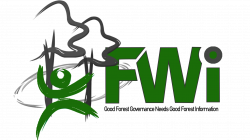Deforestation and Social Conflict Continues to Occur, Government Must Strengthen the Sustainable Forest Management System
Jakarta, 28 February 2018. FWI explained that in three periods, 718.000 hectares of natural forests had vanished in North Sumatra, East Kalimantan, and North Maluku. Every hour, 42 football-field-sized natural forests have vanished in three provinces. JPIK study of 296 IUIPHHK-HA and HT Sustainable Production Forest Management (PHPL) certificates found 197 license holders had terrible scores on the production aspect. These findings pose major questions to sustainable forest management practices, and have a strong correlation with current forest problem management slow handlings, especially in social and ecological aspects.
Today, FWI and JPIK launched the book “Deforestation Without Stopping” and “SVLK: A Process Towards Responsible Governance”. For the last three years, FWI has conducted studies in North Sumatra, East Kalimantan, and North Maluku to see trends and direct causes of deforestation. The rate of deforestation in the three provinces for the 2013-2016 period increased compared to the previous monitoring period (2009-2013), namely from 146 thousand hectares/year to nearly 240 thousand hectares/year. In North Maluku, the rate of deforestation has even more than doubled from 25 thousand hectares/year to 52 thousand hectares/year. Likewise, East Kalimantan has almost doubled, from 84 thousand hectares/year to 157 thousand hectares/year. Meanwhile, in North Sumatra, the deforestation rate decreased slightly from 37 thousand hectares/year to 29 thousand hectares/year.
Agung Ady, FWI Campaigner, revealed that ongoing deforestation has started to target areas with good natural forests, especially eastern Indonesia. “This is a warning to us that the remaining natural forests that are abundant in eastern Indonesia are very threatened. Considering the significant increase of rate and investment license that move slowly towards still densely forested areas, ” said Agung. Nearly 50% or 11.2 million hectares of land in North Sumatra, East Kalimantan, and North Maluku are controlled by corporations holding licenses (HPH, HTI, palm oil plantations, and mining). Only 4% or 812 thousand hectares of land are allocated to communities in various forms of social forestry (Community Forest, Community Plantation Forests, Forestry Partnerships, Village Forests, and Customary Forests). “Apart from being a direct cause of deforestation, inequality in land tenure in the three provinces also has an impact on social conflicts that occur between companies and communities,” continued Agung.
Delima Silalahi, Coordinator of the Study and Advocacy Division of KSPPM added, “Deforestation, which also includes community incense plants, is still occurring in the concession area of PT. Toba Pulp Lestari (TPL) in Pollung District, Humbang Hasundutan Regency. PT. TPL so far overlaps with community cultural areas. Despite the rejection from the cultural community in that location, the company is still trying to enter their cultural territory”.
The same thing was also expressed by Fathur Roziqin, Executive Director of Walhi East Kalimantan. “The tenurial conflict between the people of Lebak Cilong Village and PT. ITCI Hutani Manunggal (IHM) occurred after PT. IHM stated that they have the right to manage the land that has been dwelt by the community because they have received a concession license from the Ministry of Environment and Forestry. Even though the land has been dwelt by the community from generation to generation. “
The unresolved forestry problems have led to a forest management certification initiative known as the Timber Legality Verification System (SVLK). The system is designed to reduce the rate of deforestation that occurs in Indonesia. However, in practice, SVLK still needs improvement to create good forest governance.
In the 2014-2017 period, JPIK still found several weaknesses in the execution of the SVLK, especially in the aspects of supervision and law enforcement. Besides, independent monitoring by civil must continue to be promoted, by ensuring the continuity of monitoring and the availability of data and information. It stipulated in the SVLK regulations and the voluntary cooperation agreement between the Indonesian Government and the European Union through the FLEGT-VPA agreement.
Dhio Teguh Ferdyan, JPIK Campaigner stated, “The development, achievement, and implementation of SVLK as an effort to reform forest governance should be appreciated. Although not perfect, this document still successfully forces various parties to make improvements. “
JPIK’s monitoring reveals that 54 license holders who have SVLK certificates (PHPL and VLK) still find problems related to boundary conflicts. It also reveals that the basic rights of indigenous peoples and communities are still less recognized. And less effort on forest protection for IUPHHK-HA and HT holders. Meanwhile, industrial license owners find problems regarding the legality and mismatch of the license, the implementation of Occupational Safety and Health (K3), with unclear sources of the fulfillment of raw materials for industry.
“The assessment/audit by the Certification Body still uses the document as a reference for the license holder in obtaining the SVLK certificate. The process of issuing a license is full of corruption, the entry of illegal timber into the supply chain, and incomprehensive conflict resolution efforts should be the main focus in conducting the assessment,” Dhio continued.
- Ichwan, JPIK East Java, said that the SVLK assessment must show a trend of improving performance changes. The assessment showed that are predicated as moderate or poor should change to good during the period of surveillance or re-certification.
The transparency of the SVLK implementation must also be improved. The entire process of implementing the SVLK, including the provision of data and information for monitoring, the process of handling reports, and the execution must be open and accessible to the public. “Even though the rights and obligations of independent monitoring have been stipulated in the SVLK regulations, Independent Monitors still experience limitations in accessing data and information, especially ones which under the authority of the Regional Government,” Ichwan continued.
JPIK has highlighted the weakness of law enforcement and the imposition of sanctions on license holders. Strict sanctions for certificate revocation for license holders with poor performance and refuse surveillance must be followed up with business license revocation. On the other hand, efforts in timber administration to minimize the mixing of illegal timber into the SVLK supply chain and avoid discoordination between central and regional institutions must be improved.
As a system, the SVLK must place social / conflict aspects, the process of obtaining a license (license corruption), and forest fires as the main indicators of passing the assessment. Besides, the synergy to prevent and enforce the law with the prevailing regulations must be constantly carried out so that the SVLK truly becomes the manifestation of a credible and accountable good governance instrument.
Editor’s Note:
- During 2013-2016, natural forests in North Sumatra, East Kalimantan, and North Maluku, has lost an area of 718 thousand hectares. Of the total 718 thousand hectares of deforestation that occurred in the three provinces, around 517 thousand hectares (72%) occurred in areas that had burdened with a management license. Whether it’s HPH, HTI, palm oil plantations, and mining. The concession area was the severest contributor to deforestation, covering 83.8 thousand hectares, followed by mining 83.3 thousand hectares, palm oil plantations 76 thousand hectares, and HTI 37 thousand hectares. Meanwhile, there are around 235 thousand hectares of deforestation in areas where license overlap.
- The total land area of North Sumatra, East Kalimantan, and North Maluku are 22.7 million hectares.
- SVLK is a Timber Legality Verification System, a requirement to fulfill the legality of timber/products proposed based on the agreement between forestry stakeholders containing standards, criteria, indicators, verifiers, verification methods, and assessment norms. SVLK is a timber legality assurance system recognized in the VPA between Indonesia and the European Union.
- VPA is a bilateral agreement within Forest Law Enforcement Governance and Trade (FLEGT) between timber-producing countries and the European Union, aiming to eradicate illegal timber trade. The VPA includes negotiations regarding the Timber Legality Assurance System and FLEGT export licenses issued to verified legal timber products. Shipments of timber with a FLEGT Export license will get a “green route” to the European Union market and are free from EU Timber Regulation. The FLEGT-VPA between Indonesia and the EU was signed on September 30, 2013, and ratified by both parties in 2014.
- The FLEGT license validates the SVLK (full implementation VPA) scheme so that the EU does not need to carry out due diligence anymore. FLEGT licensing cannot commence until a combined assessment of the Indonesian and EU legality verification system confirms that the system is fully operational, as outlined in the VPA. The evaluation criteria are detailed in Annex VIII of the VPA. As of September 2016, Indonesia has more than 20 FLEGT licensing authority agencies.
Contacts for Interview:
- Soelthon Gussetya Nanggara, Executive Director of FWI sulton@fwi.or.id; +6285649638037
- Agung Ady Setyawan, FWI Campaigner agung_ady@fwi.or.id +6285334510487
- Dhio Teguh Ferdyan, JPIK Campaigner dhio.jpik@gmail.com +6281374139842, related news
- Ichwan, JPIK East Java ichwan.pplh@gmail.com +6281335174892
- Fathur Roziqin, Executive Director of Walhi East Kalimantan fathur@walhikaltim.or.id +6281226800223
Delima Silalahi, Coordinator of the KSPPM Study and Advocacy Division dyan_eunique@yahoo.com +6282168917360



